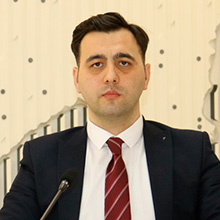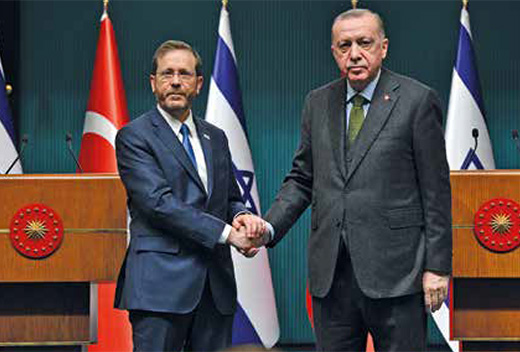
Russia and Iran in Syria: A Competitive Partnership?  By Igor MATVEEV, PhD, Senior Research Fellow at the Institute of Oriental Studies, and RIAC expert, Moscow By Igor MATVEEV, PhD, Senior Research Fellow at the Institute of Oriental Studies, and RIAC expert, Moscow
Yeghia TASHJIAN, Beirut-based regional analyst and researcher, columnist, "The Armenian Weekly”
Russia’s ongoing special military operation in Ukraine has sparked broad and intensive debates about future modalities of the relations between Russia and Iran in Syria. Western and Israeli analysts predict an essential growth of the political, military, and economic presence of Tehran due to Moscow’s attention switching from Syria to Ukraine. This, in turn, may shift the whole dynamics of the Russian-Iranian relations on the Syrian dossier. On the contrary, despite reports of minor pull-outs from Syria along with international media leaks about transfers of military sites to Iran and Hezbollah, Russian representatives consistently reject such forecasts, referring to a “routine rotation” but “absolutely not a withdrawal” of the Russian troops. Those speculations have intensified on the eve of the trilateral meeting of the Iranian, Russian, and Turkish leaders on Syria scheduled for July 19, 2022, in the Iranian capital. READ MORE
- EGF Editor |
Published on EGF: 21.07.2022
| External Relations
-
Realism Should Be the Basis for the Armenia-Turkey Normalisation  By Benyamin POGHOSYAN, PhD, Chairman, Center for Political and Economic Strategic Studies By Benyamin POGHOSYAN, PhD, Chairman, Center for Political and Economic Strategic Studies
There should be realistic expectations of what can result from ongoing discussions on the normalisation of relations between Armenia and Turkey. Given the current situation in the South Caucasus, the region is far away from peace, and no one should have hopes that Armenia – Turkey normalization will solve conflicts and bring an era of peace to the region. However, in the current situation, even a contribution to regional stability is too significant an opportunity to miss.
The 2020 Karabakh war has significantly changed the geopolitics of the South Caucasus and triggered new processes. Turkey’s war involvement seemed to worsen further Armenia – Turkey relations. The Armenian government imposed a ban on imports from Turkey from January 2021 due to Turkey's open and evident promotion and support for the Azerbaijani war effort. However, after the early parliamentary elections in Armenia held in June 2021, Armenian officials started to speak about the necessity to normalize relations with Turkey. These discussions ended with the assignment of a special representatives to start negotiations, and the first meeting took place on January 14, 2022. READ MORE
- EGF Editor |
Published on EGF: 21.07.2022
| External Relations
-
Do Armenia and Azerbaijan Move to Peace?  By Benyamin POGHOSYAN, PhD, Chairman, Center for Political and Economic Strategic Studies By Benyamin POGHOSYAN, PhD, Chairman, Center for Political and Economic Strategic Studies
In recent months, some positive momentum was registered in Armenia-Azerbaijan talks. The sides established national commissions on border delimitation and demarcation, and after a six-months break, the trilateral Armenia-Russia-Azerbaijan commission on restoration of communication resumed its work. According to Russian sources, later confirmed by the Armenian deputy prime minister, the sides achieved significant progress in the negotiations, almost reaching an agreement on the route of the highway, which will connect Azerbaijan with Nakhichevan via the Syunik region of Armenia, as well as on modalities of border and customs control. The agreement to open the Armenia-Turkey land border for the crossing of third country citizens and launch direct air cargo trade between the two countries, achieved during the July 1 meeting of Armenia and Turkey representatives, seemed to add a more positive environment in the South Caucasus geopolitics. READ MORE
- EGF Editor |
Published on EGF: 14.07.2022
| Security
-
Russia’s Need to Circumvent Sanctions Gives New Life to North-South Project
 By Fuad SHAHBAZOV, Baku-based independent regional security and defence analyst By Fuad SHAHBAZOV, Baku-based independent regional security and defence analyst
With the unprovoked military intervention in Ukraine, Russia has been isolated economically and politically due to the Western-imposed sanctions. But while the sanctions banned Russia from trading with the Western states, particularly in the energy field, some nations still prefer to maintain trade relations with Moscow. Countries like Iran, China and India are seeking to strengthen trade turnover by pushing the International North-South Transport Corridor (INSTC) project for a better connection via a multimodal transport network that spans rail, road, and sea. READ MORE
- EGF Editor |
Published on EGF: 14.07.2022
| External Relations
-
Agreement on Nuclear Deal Increasingly Unlikely  By Benyamin POGHOSYAN, PhD, Chairman, Center for Political and Economic Strategic Studies By Benyamin POGHOSYAN, PhD, Chairman, Center for Political and Economic Strategic Studies
The election of Joe Biden as president in November 2020 raised hopes among the international community that the United States will restore the nuclear deal signed in 2015. Many architects of the deal returned to positions in the White House and State Department. The other signatories of the deal, including the three EU states, China and Russia, were ready to contribute to the restoration of the deal. Conventional wisdom said that Iran should be interested in restoring the deal, too. The economic downturn triggered by the re-imposition of the US sanctions created significant challenges for the Iranian government. READ MORE
- EGF Editor |
Published on EGF: 06.07.2022
| External Relations
-
The War in Ukraine and the Future of the World Order  By Benyamin POGHOSYAN, PhD, Chairman, Center for Political and Economic Strategic Studies By Benyamin POGHOSYAN, PhD, Chairman, Center for Political and Economic Strategic Studies
Since the start of the Ukraine war in February 2022, discussions have been underway about the impact of the war on the evolving global order. The transformation of the world order is a very complicated and multi-layered process, and history tells us that it takes decades and is often accompanied by bloody conflicts between great powers. In the last decade, there were several prevailing predictions of the world order – a new bipolar world dominated by the US and China, a multipolar world with several equal players such as the US, China, Russia, India and the EU, and a nonpolar world characterized by constant conflicts and instability. READ MORE
- EGF Editor |
Published on EGF: 01.07.2022
| External Relations
-
Azerbaijan’s Latest Steps Toward Becoming a Regional Digital Hub  By Ayaz MUSEYIBOV, Head of Department, Center for Analysis and Communication of Economic Reforms of the Republic of Azerbaijan
By Ayaz MUSEYIBOV, Head of Department, Center for Analysis and Communication of Economic Reforms of the Republic of Azerbaijan
After implementing a number of trans-Eurasian energy and logistics mega-projects, such as the Baku–Tbilisi–Ceyhan oil pipeline, Southern Gas Corridor and Trans-Caspian International Transportation Route, Azerbaijan has also strategically committed itself to policies designed to turn the South Caucasus country into a regional digital hub. This initiative has already secured buy in from several countries and major companies in the IT space. Notably, this past April, Italy’s largest internet service provider and one of the world’s leading operators, Sparkle, and Azerbaijan’s top wholesale telecommunications operator, AzerTelecom, signed a memorandum of understanding on cooperation within the framework of the Digital Silk Way project (not to be confused with China’s Digital Silk Road), aimed at creating a digital telecommunications corridor connecting Europe and Asia via Azerbaijan. READ MORE
- EGF Editor |
Published on EGF: 01.07.2022
| Markets
-
Israeli-Turkish Relations: Challenges and Opportunities  By Eugene KOGAN, Tbilisi-based defence and security expert By Eugene KOGAN, Tbilisi-based defence and security expert
Even though Israel and Turkey normalised relations in June 2016 following the May 2010 Mavi Marmara Flotilla incident when Israeli soldiers killed ten people on board a Turkish vessel and the subsequent diplomatic rupture, Ankara’s support of the Hamas movement situated in the Gaza Strip continues to undermine bilateral relations.
The establishment of an official office in Istanbul in 2012 and its members are perceived as a thorn in the eye by the Israeli Government. Tel Aviv would like Erdoğan to close the Hamas office and expel its members from Turkey; however, this Israeli wish is not going to be granted any time soon since Erdoğan’s words do not translate into deeds. The signature of the Abraham Accords highlighted two divergent trends in the region: Turkey’s continued isolation and Israel’s strengthened position. This resulted in Erdoğan’s intention to improve relations with Israel. READ MORE.
- EGF Editor |
Published on EGF: 23.06.2022
| External Relations
-
Iran’s "Game of Drones" in the Middle East
 By Fuad SHAHBAZOV, Baku-based independent regional security and defence analyst By Fuad SHAHBAZOV, Baku-based independent regional security and defence analyst
Amid mounting domestic unrest and ongoing diplomatic standoffs with regional states, Iran has devoted a significant and increasing amount of national resources toward upgrading its national drone program. On May 17, the Iranian government officially inaugurated its first overseas drone factory in Dushanbe, Tajikistan; the facility manufactures the indigenous Ababil-2, a multipurpose drone model with reconnaissance, combat, and suicide capabilities. The Ababil-2 boasts a maximum range of 200 kilometres and can sustain roughly 90 minutes of flight time. The new drone factory will help Iran to improve relations with Tajikistan after a period of lingering diplomatic tension, and General Mohammad Bagheri described its inauguration as a turning point in bilateral military cooperation between the two countries. READ MORE
- EGF Editor |
Published on EGF: 23.06.2022
| Security
-
Restoring Communication Links is an Important Confidence-building Measure  By Benyamin POGHOSYAN, PhD, Chairman, Center for Political and Economic Strategic Studies By Benyamin POGHOSYAN, PhD, Chairman, Center for Political and Economic Strategic Studies
There is broad consensus in the region and in the international community on the need to restore communications in the South Caucasus and on the possibility of finding mutually accepted solutions for this to be achieved. However the constant focus on the routes passing via the Syunik region and connecting Azerbaijan with Nakhijevan has made the whole process of restoration of communications a bone of contention for both sides. The restoration of communications may still play a positive role in the establishment of good neighbourly relations between Armenia and Azerbaijan, by creating conditions from which both societies can benefit. However, if the sides continue this tit-for-tat discussion around the "Zangezur corridor," blaming each other for violating previous agreements, the restoration of communications issue will only deepen the mistrust between them, he adds. Starting instead with a railway connection between Armenia and Nakhijevan via Yersakh on the other hand, requires only a further 1 km of railroad to be constructed, and will serve as a significant confidence-building measure between Armenia and Azerbaijan and will make it easier for Armenia and Azerbaijan to agree on the modalities for the restoration of other routes. READ MORE
- EGF Editor |
Published on EGF: 23.06.2022
| External Relations
-
|
|
